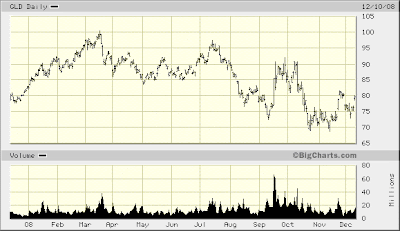
In my November 6th post ("Obama Rally and Market Strategy"), I concluded with the following:
I'm also keeping an eye on the currencies. I sold our yen exposure back on the 24th when it spiked, leaving us with exposure to only the Chinese renminbi. I should have rolled the Yen exposure into the Canadian dollar at the time, but I missed it. The long-term fundamentals of the U.S. do not support its recent strength. The strong move in the dollar has been largely due to short-term technical reasons as well as a knee-jerk flight-to-safety. I am very negative on the dollar (long-term) at these levels and will likely be buying the Canadian dollar if it weakens much further.
The weakness in the Canadian dollar can largely be attributed to two factors: political turmoil and the country's heavy reliance on the natural resource industry. Canada's Prime Minister recently suspended Parliament until January 26th in an effort to forestall a bid by the opposition to oust him. The markets don't much care for uncertainty, so the loonie (the nickname given to the Canadian one dollar coin) has come back under pressure. I don't know how long this political turmoil will persist, but in time it is certain to pass, and the political uncertainty discount currently being pinned to the loonie will evaporate.
The other burden impacting the loonie is Canada's heavy exposure to free-falling commodity prices. Although beer, hockey equipment, and cross-border pharmaceutical sales may be sustained, they won't be able to offset the weakness from the country's natural resource sector. Canada will certainly be impacted near-term by the dramatic fall in natural resource prices, but those lower prices are already leading to less exploration and development and are sowing the seeds of the next commodity bull market.
Not surprisingly, Canada's economy has been weakening, but its problems seem almost quaint in comparison to ours. Until just the past few months, Canada had run a budget surplus for 8 years and even managed to pay down some of its national debt -- a debt that stands at roughly 32% of GDP versus a level close to 75% for the U.S. Canada's economy is only 10% the size of ours. While we're likely to run a deficit in 2009 somewhere in the $1 trillion range, the liberals and conservatives in Canada have been busy bickering over whether to run a deficit of $10-20 billion (we just "gave" that much to GM and Chrysler). While we're launching a full-scale offensive on our dollar, the Canadians are having a playful pillow fight with theirs.
Put simply, the fundamentals of Canada are more robust than those of the U.S. Political uncertainty will be resolved, and the foundation of the next bull commodity cycle is currently being established. In the meantime, some comfort can be taken in knowing that Canadian legislators (despite current politiking) are acting in a far more fiscally prudent manner than our government officials.
Our currency exposure now includes gold, the Chinese renminbi, and the Canadian dollar. We sold our yen exposure (FXY) back on October 24th at prices between $106-107. Although FXY has continued to move higher and currently stands at $111, we rolled our yen proceeds into Chinese stocks (FXI) on the same day at prices between $21-22, and that ETF now stands at $28.
The renminbi has been quiet this year, making it a strong outperformer relative to most assets. I continue to like this currency for the long-term given China's strong reserves position and, more importantly, the country's strong growth prospects in the coming years. My near-term expectations for the currency are very modest given conflicting pressure officials face to both lower and raise the exchange rate. However, the longer-term fundamentals of China and the current account imbalances that exist between China and much of the developed world will continue to exert upward pressure on the renminbi over time.
Finally, we've been long gold for some time, and I continue to feel very good about its prospects. Supply remains constrained while global fiat currency debasement accelerates. Were it not for mass forced de-leveraging, I suspect that gold would already be at new highs. We added to GDX in mid-October, and we recently added a new junior gold position. Gold has had a nice move of late, but each rally since September has subsequently failed. Gold is likely consolidating and moving into stronger longer-term hands. If so, at some point I would expect it to push through to new highs. In the meantime, I continue to opportunistically add to the metal and the mining equities on pullbacks.
The Market Rubbernecker is affiliated with Aspera Financial, LLC, a registered investment advisor. Please read the disclaimer on the home page of the Market Rubbernecker site.







